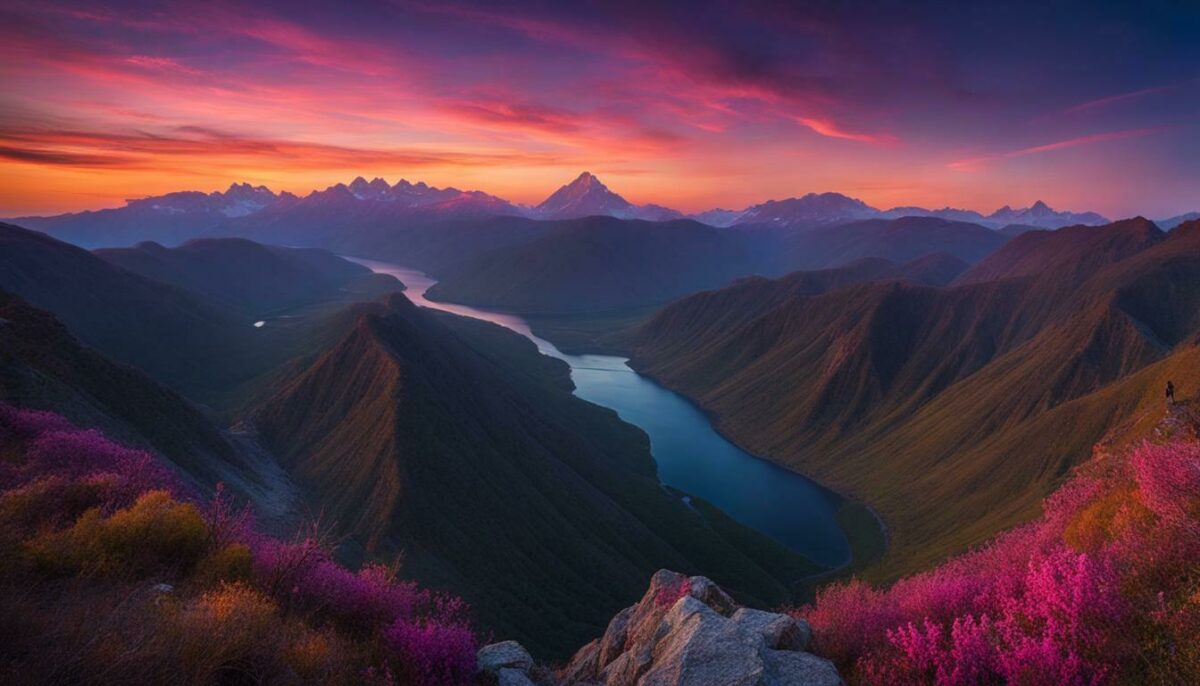Lord Byron quotes have a timeless quality that resonates with those seeking adventure and a connection to nature. In this article, we explore how his words intertwine with the spirit of “Into the Wild.”
- Lord Byron’s quotes evoke a sense of adventure and inspire a connection to nature.
- His words are relevant to the themes explored in the movie “Into the Wild.”
- “Into the Wild” utilizes cinematic elements to depict the protagonist’s journey and connection to the wild.
- Lord Byron’s quotes continue to inspire individuals to embrace the untamed beauty of nature.
- The movie reinforces the poet’s timeless wisdom through its narrative and visual elements.
The Wild Spirit: Lord Byron and Into the Wild
Both Lord Byron and the movie “Into the Wild” share a common thread – a deep appreciation for the wild and its ability to inspire and transform individuals. Lord Byron, a renowned poet of the Romantic era, had an affinity for the untamed beauty of nature, which is evident in his evocative and poetic quotes. Similarly, the film “Into the Wild” explores the protagonist’s journey into the wilderness as a means of seeking solace, self-discovery, and freedom.
Lord Byron’s quotes about the wild and nature capture its essence in a way that resonates with the themes portrayed in “Into the Wild.” His words paint vivid pictures of the untamed landscapes, invoking a sense of awe and wonder. They remind us of the profound connection between humans and the natural world, and how nature has the power to inspire, heal, and transform.
One of Lord Byron’s famous quotes, “There is pleasure in the pathless woods,” holds a particular significance in relation to the movie. It encapsulates the protagonist’s desire to escape the constraints of society and immerse himself in the solitude and raw beauty of nature. It reflects the notion that true pleasure can be found in embracing the wild and forging a deeper connection with the natural world.

In “Into the Wild,” Lord Byron’s quote is displayed at the beginning of the movie, setting the tone for the protagonist’s mindset and his adventurous journey. It serves as a reminder of the untamed spirit that resides within us, urging us to break free from societal norms and embrace the wildness within ourselves. The quote encapsulates the essence of the movie, echoing its message of courage, self-discovery, and the pursuit of personal freedom.
In conclusion, Lord Byron’s quotes and the movie “Into the Wild” intertwine to create a narrative that celebrates the wild and its transformative power. They both inspire individuals to connect with nature, seek solitude, and embark on a journey of self-discovery. By exploring Lord Byron’s quotes, we gain a deeper understanding of the profound impact that the wild can have on our lives, pushing us to embrace adventure, explore the untamed, and find inspiration in the beauty of nature.
Finding Pleasure in Nature: Lord Byron’s Perspective
Lord Byron once said, “There is pleasure in the pathless woods, there is rapture in the lonely shore,” a sentiment that encapsulates the allure of nature’s untouched beauty and its ability to bring joy and fulfillment. In the movie “Into the Wild,” this quote resonates deeply with the protagonist’s journey of self-discovery and his quest for a deeper connection with the natural world.
Chris McCandless, the central character of “Into the Wild,” seeks solace and a sense of purpose in the untamed wilderness. Just as Lord Byron found pleasure in nature, Chris finds freedom and comfort in the solitude of the wild. The quote reminds us of the power that nature holds to rejuvenate and inspire, offering a sanctuary from the pressures and constraints of society.
In the film, we witness Chris immersing himself in the beauty of nature, venturing into uncharted territories with a spirit of exploration. He embraces the unknown, finding fulfillment and meaning in the simplicity of his surroundings. Through the lens of Lord Byron’s perspective, we understand the profound impact that nature can have on an individual’s journey of self-discovery.
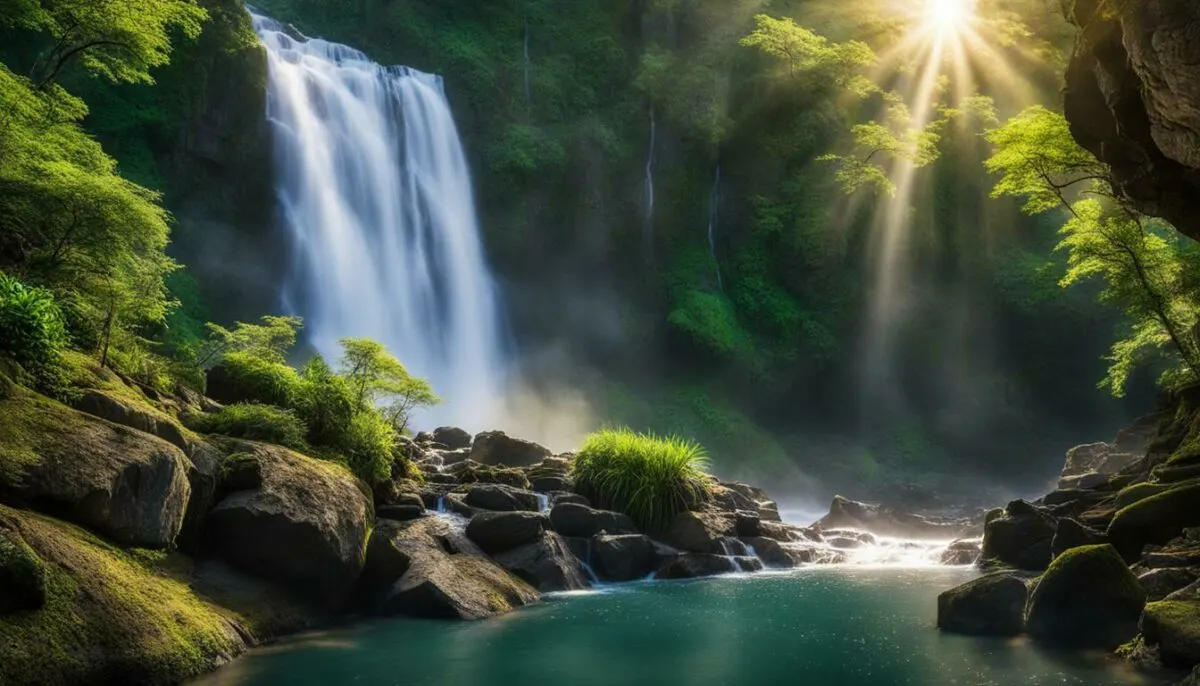
| Quote | Source |
|---|---|
| “There is pleasure in the pathless woods, there is rapture in the lonely shore.” | Childe Harold’s Pilgrimage |
| “Roll on thou deep and dark blue Ocean – roll!” | Childe Harold’s Pilgrimage |
| “There’s naught, no doubt, so much the spirit calms as rum and true religion.” | Don Juan |
Lord Byron’s words continue to serve as a reminder of the harmony that can be found in the natural world. They inspire us to seek solace and purpose in the embrace of nature’s untouched beauty, just as Chris McCandless did in his unforgettable journey “Into the Wild.”
Setting the Tone: Lord Byron Quote in “Into the Wild”
As the opening scene of “Into the Wild” unfolds, a powerful Lord Byron quote emerges, painting a vivid picture of the protagonist’s restless spirit and his desire to seek the untamed depths of the wilderness.
“There is pleasure in the pathless woods, there is rapture in the lonely shore, there is society where none intrudes, by the deep sea, and music in its roar; I love not Man the less, but Nature more.”
The quote, beautifully written by Lord Byron, captures the essence of Chris McCandless’ journey as he embarks on a daring adventure into the wilderness. It sets the tone for the movie, foreshadowing the protagonist’s longing for escape from societal constraints and his yearning to embrace the unspoiled beauty of nature.
The visual appeal of “Into the Wild” is heightened by the breathtaking cinematography that accompanies this powerful quote. The camera captures sweeping shots of vast landscapes, majestic mountains, and serene rivers, allowing the audience to feel the same sense of awe and wonder that Chris experiences on his journey of self-discovery.
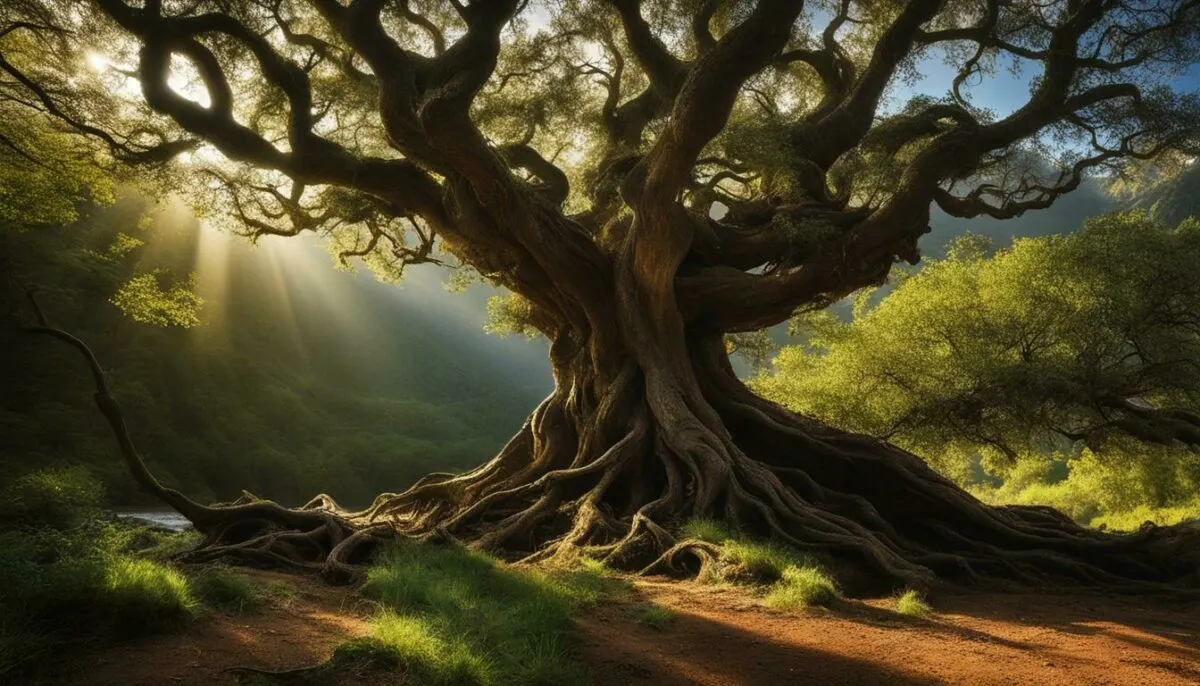
This image perfectly complements the Lord Byron quote, encapsulating the essence of the protagonist’s desire to immerse himself in the wild. The combination of the quote and the visual representation evokes a sense of freedom, adventure, and connection to nature, emphasizing the profound impact of Lord Byron’s words in shaping the narrative of “Into the Wild.”
| Key Points: | Lord Byron Quotes in Relation to “Into the Wild” |
|---|---|
| 1. | Lord Byron’s quote sets the tone for the protagonist’s mindset and desire for an adventurous journey into the wilderness. |
| 2. | The combination of Lord Byron’s evocative words and the visually stunning cinematography creates a powerful and immersive experience for the audience. |
| 3. | The quote beautifully captures the protagonist’s longing for solitude, freedom, and a deeper connection with nature. |
| 4. | Lord Byron’s influence resonates throughout the film, highlighting the enduring relevance of his quotes in inspiring individuals to embrace the wild. |
Cinematic Elements and Nature: A Visual Journey
Through stunning cinematography and breathtaking shots of natural landscapes, “Into the Wild” presents a visual journey that parallels the poetic nature of Lord Byron’s quotes. The movie skillfully captures the protagonist’s deep connection with nature and his quest for self-discovery in the wild.
One of the most visually striking scenes in the film is when Chris McCandless, the main character, stands on the edge of a vast canyon. The camera pans out, revealing the awe-inspiring beauty of the natural world. This scene, accompanied by Lord Byron’s quote, “There is a pleasure in the pathless woods,” encapsulates the protagonist’s longing for freedom and adventure.
The film’s cinematography transports viewers to various breathtaking locations, from lush forests to snow-capped mountains. Each shot serves as a visual interpretation of Lord Byron’s poetic quotes, emphasizing the power of nature to inspire and transform. The imagery evokes a sense of wonder and invites viewers to contemplate their own connection to the natural world.
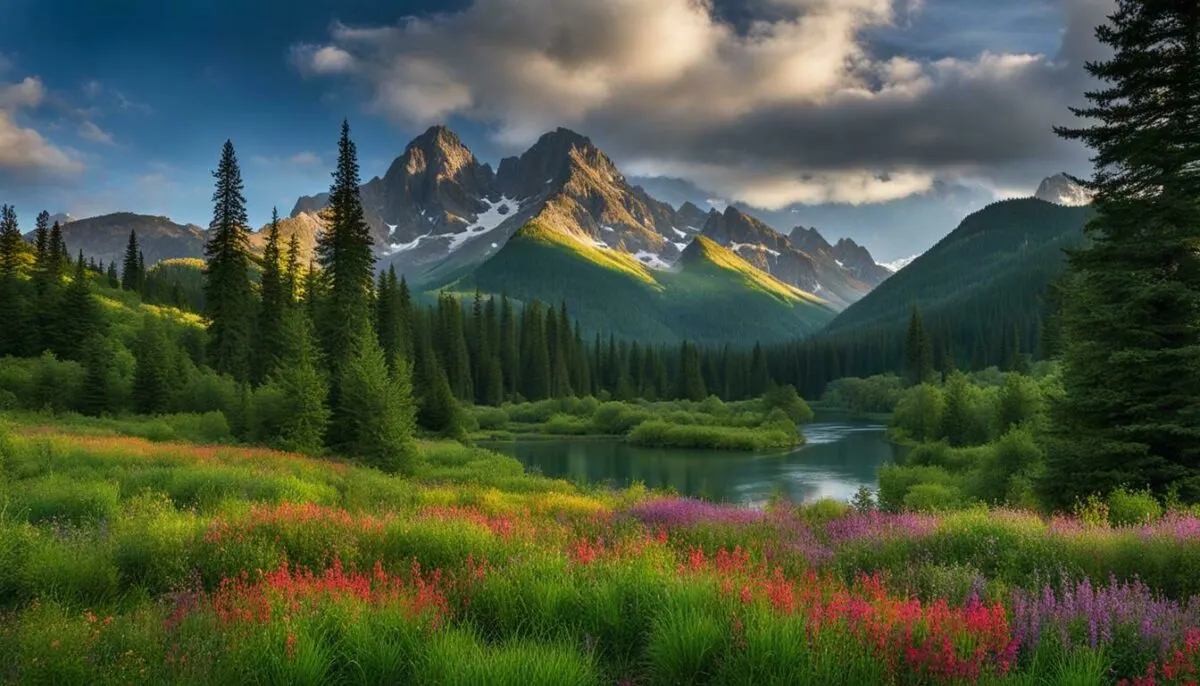
The immersive nature of “Into the Wild” allows audiences to feel as though they are embarking on the adventure alongside Chris. The cinematography and visual effects create an atmosphere that reflects the wild and untamed spirit conveyed in Lord Byron’s quotes. It is a powerful testament to the enduring impact of both the poet’s words and the movie’s artistic representation of nature’s beauty.
The Power of Cinematic Storytelling
Combining the evocative words of Lord Byron with the captivating cinematography of “Into the Wild,” the movie invites viewers to embark on a profound and visually stunning journey. The seamless integration of nature’s grandeur and the protagonist’s personal growth resonates with audiences, reminding us of the timeless power of the wild and its ability to inspire the human spirit.
| Key Elements | Examples |
|---|---|
| Stunning Nature Shots | Snow-capped mountains, glistening rivers, and dense forests. |
| Adventure and Self-Discovery | Chris McCandless’ journey into the unknown and his search for meaning. |
| Visual Interpretation of Lord Byron | Scenes that mirror the poet’s words, highlighting the connection between humans and nature. |
Musical Harmony and Poetic Lyrics: Enhancing the Wild Experience
The marriage of music and poetic lyrics in “Into the Wild” not only heightens the emotional impact of the film but also resonates with Lord Byron’s ability to evoke powerful imagery through his words. From the opening scene to the exhilarating moments of adventure, the soundtrack of the movie complements the protagonist’s journey and amplifies the wild and untamed spirit that Lord Byron captures in his poetry.
Just as Lord Byron’s verses transport readers to distant landscapes and evoke a sense of awe, the musical compositions in “Into the Wild” create an immersive experience for the audience. The enchanting melodies and lyrical storytelling enhance the visual narrative, allowing viewers to connect on a deeper level with the protagonist’s yearning for freedom and exploration.
“Into the Wild” harnesses the power of music to convey the protagonist’s emotional journey and intensify the wildness of his experiences. The melodic harmonies and poignant lyrics serve as a backdrop for the protagonist’s exploration of nature, reflecting Lord Byron’s profound understanding of the transformative power of the wild.
Just as Lord Byron’s poetic words paint vibrant pictures in the reader’s mind, the film’s soundtrack paints a sonic landscape, evoking a sense of wonder and adventure. The synergy between music and poetry in “Into the Wild” creates a multisensory experience that immerses the audience in the protagonist’s quest for self-discovery, paralleling the profound connection to nature that Lord Byron’s quotes often inspire.
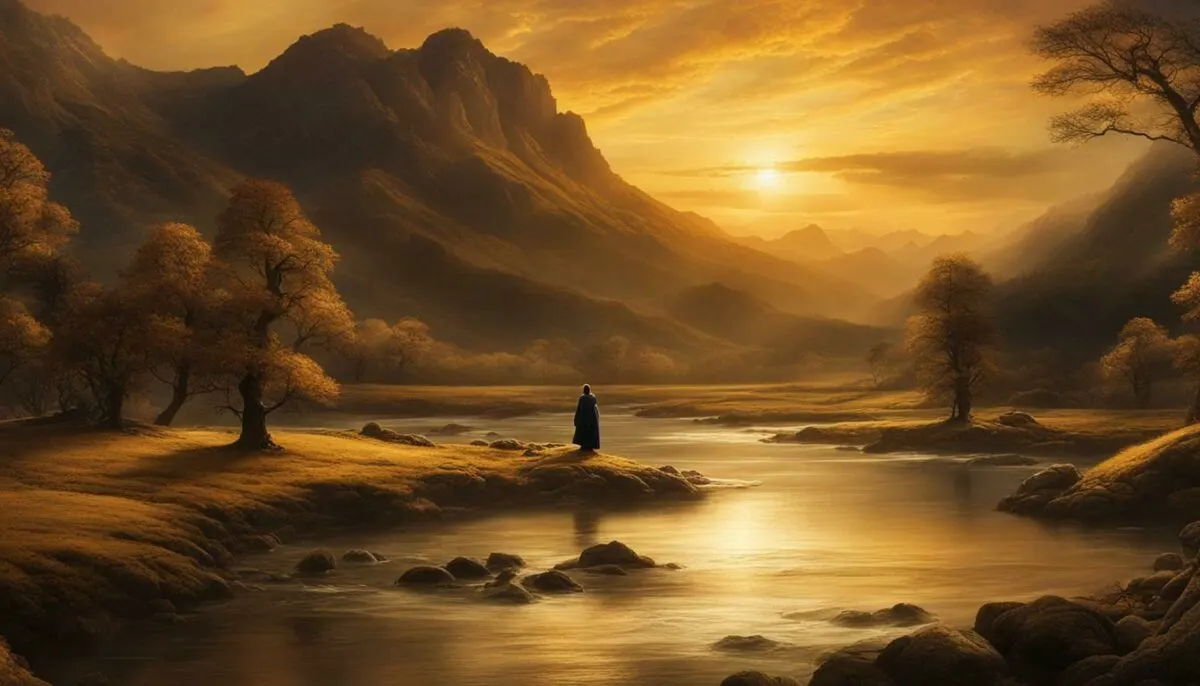
Lord Byron’s defiance of societal norms and his embrace of the wild served as a profound influence on both his poetry and the motivations of the protagonist in “Into the Wild.” Byron’s rebellious spirit, often reflected in his famous quotes, resonates with individuals who yearn for freedom and seek an escape from the constraints of society.
One of Lord Byron’s well-known quotes that encapsulates this sentiment is, “There is pleasure in the pathless woods, there is rapture in the lonely shore.” This line speaks to the desire to break away from the trappings of civilization and find solace and fulfillment in the untamed beauty of nature. It echoes the protagonist’s yearning for a simpler, more authentic existence, away from the pressures and expectations of modern society.
“There is pleasure in the pathless woods, there is rapture in the lonely shore.”
The protagonist in “Into the Wild” seeks to challenge societal norms by embarking on a journey of self-discovery and exploration, akin to Lord Byron’s own desire to push boundaries and live life on his own terms. This shared spirit of defiance against societal constraints serves as a driving force throughout the movie, propelling the protagonist to embark on his adventurous quest and inspiring individuals to question the status quo.
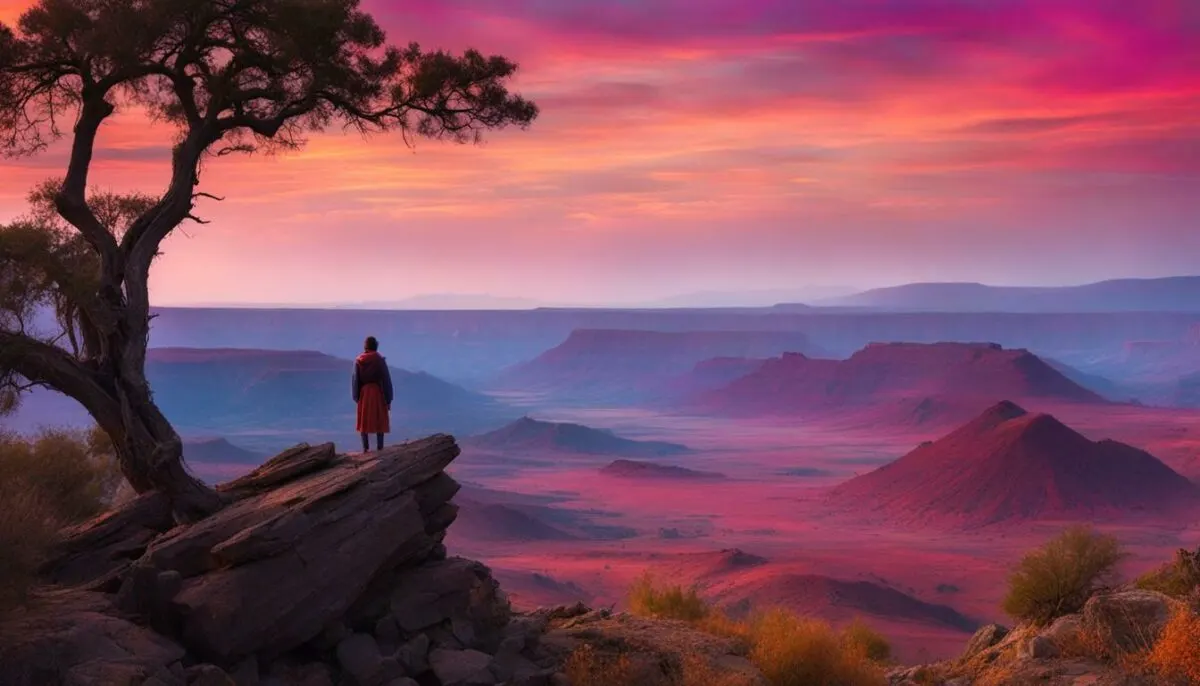
Through Lord Byron’s influence, “Into the Wild” reminds us of the transformative power of nature and the freedom that can be found in embracing the wild. Both Byron’s quotes and the film evoke a sense of adventure, encouraging individuals to venture beyond the comforts of societal norms and explore the unknown. It is a call to break free from the constraints that bind us and embark on a journey of self-discovery, just as the protagonist of “Into the Wild” did.
Table 1: Byron’s Quotes that Inspire a Wild Spirit
| Quote | Relevance |
|---|---|
| “There is pleasure in the pathless woods, there is rapture in the lonely shore.” | Reflects the protagonist’s desire for solitude and the transformative power of nature. |
| “I love not man the less, but Nature more.” | Emphasizes the protagonist’s affinity for the natural world and his rejection of societal conventions. |
| “Roll on, thou deep and dark blue Ocean- roll!” | Evokes the vastness and majesty of nature, inspiring a sense of adventure and exploration. |
Embracing Solitude: Lord Byron’s Introspective Spirit
“Man, being reasonable, must get drunk,” Lord Byron once mused, revealing his inclination for introspection and the exploration of one’s inner self, a sentiment that mirrors the protagonist’s search for personal enlightenment in “Into the Wild.” As Chris McCandless embarked on his solitary journey into the wilderness, he sought to disconnect from societal constraints and immerse himself in the raw beauty of nature. Similarly, Lord Byron’s poetic spirit embraced solitude as a means to delve deep into his own thoughts and emotions, finding inspiration in the solitude of his surroundings.
The theme of embracing solitude resonates throughout Lord Byron’s quotes, as he believed that escaping the noise of the world allows for introspection and self-discovery. In “Into the Wild,” Chris McCandless seeks solace in the isolation of the Alaskan wilderness, using the absence of societal distractions to reflect on his own desires and purpose. It is through this solitude that both Lord Byron and the movie’s protagonist are able to find a sense of inner peace and understand themselves in a profound way.
Lord Byron’s introspective spirit is beautifully echoed in the cinematography of “Into the Wild.” The film captures the vastness and solitude of the natural landscapes, reflecting the protagonist’s journey of self-discovery. Through breathtaking visual shots, viewers are transported into Chris McCandless’ world, immersing themselves in the same solitude that inspired Lord Byron’s poetic musings. The accompanying soundtrack further enhances the introspective atmosphere, connecting the audience to the protagonist’s emotions and inner thoughts.
The embrace of solitude, as depicted both in Lord Byron’s quotes and “Into the Wild,” serves as a reminder of the transformative power that can be found in introspection and self-reflection. The exploration of one’s own thoughts and emotions, away from the noise of society, allows for personal growth and the discovery of one’s true self. Lord Byron’s words, echoed in the protagonist’s journey, inspire us to seek moments of solitude and introspection in our own lives, recognizing that within the silence lies the wisdom and clarity we seek.
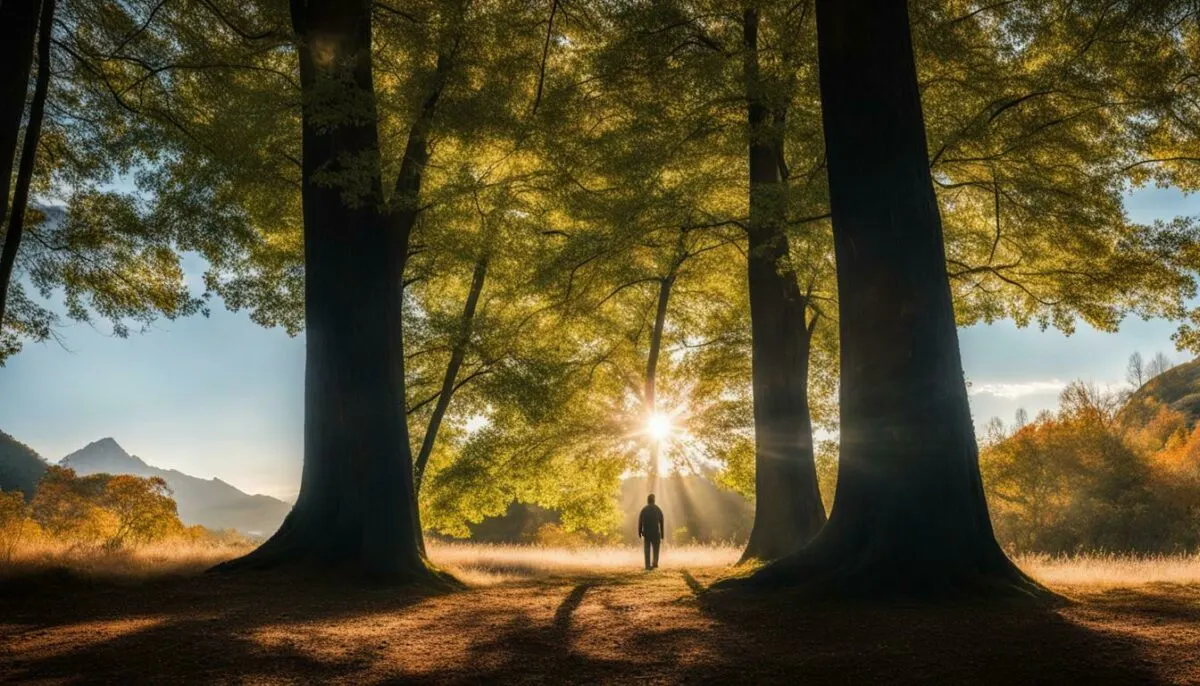
| Famous Quotes by Lord Byron | Inspirational Quotes | Poetic Quotes |
|---|---|---|
| “Man, being reasonable, must get drunk.” | “There is pleasure in the pathless woods.” | “The great object of life is sensation.” |
| “Sorrow is knowledge, those that know the most must mourn the deepest.” | “She walks in beauty, like the night.” | “There is a pleasure in the pathless woods.” |
| “The mind is its own place, and in itself can make a heaven of hell, a hell of heaven.” | “The name of a writer is sacred.” | “I love not man the less, but nature more.” |
Nature’s Lessons: Lord Byron’s Influence on Self-Discovery
Lord Byron’s keen observation of nature’s teachings provides a source of inspiration for those embarking on a journey of self-discovery, much like the protagonist in “Into the Wild.” His famous quotes resonate with the transformative power of the natural world, encouraging individuals to seek solace and enlightenment in the untamed beauty that surrounds them.
“There is a pleasure in the pathless woods,
There is a rapture on the lonely shore,
There is society, where none intrudes,
By the deep sea, and music in its roar:
I love not Man the less, but Nature more”
This profound quote by Lord Byron captures the essence of the protagonist’s journey in “Into the Wild.” It speaks to the joy found in exploring the wilderness, away from the constraints of society. In the movie, Chris McCandless seeks liberation by immersing himself in nature, discovering a deep connection that resonates with Lord Byron’s words.
The film beautifully portrays this connection, using visual shots and cinematography to capture the raw, untamed landscapes that both inspire and challenge the protagonist. The sweeping vistas and breathtaking scenery serve as a reflection of the protagonist’s internal journey, echoing Lord Byron’s belief in the power of nature to teach and transform.
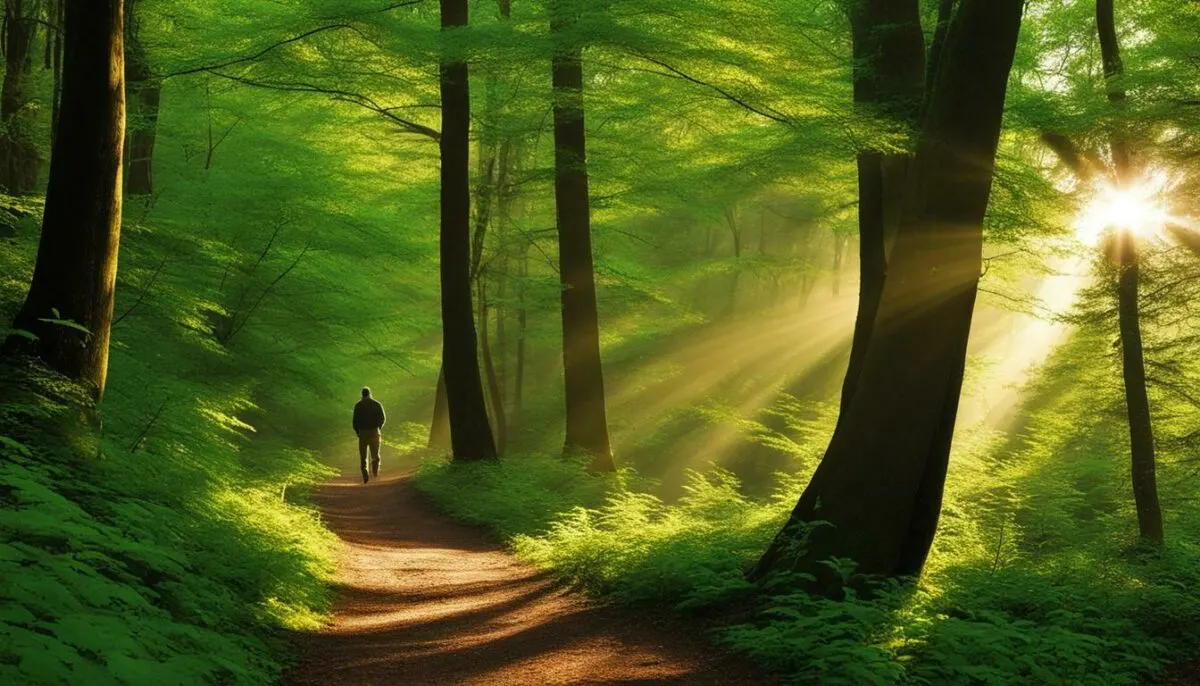
As Chris McCandless navigates the wilderness, he learns valuable lessons about self-reliance, resilience, and the fragile yet enduring beauty of the natural world. Lord Byron’s inspirational quotes resonate throughout his journey, guiding him towards self-discovery and a deeper understanding of his place in the universe.
| Lessons from Lord Byron’s Quotes |
|---|
| “There is pleasure in the pathless woods” |
| “There is society, where none intrudes” |
| “I love not Man the less, but Nature more” |
Lord Byron’s profound words continue to inspire individuals to venture into the wild, embracing solitude, and connecting with nature in meaningful ways. Just as Chris McCandless found solace, growth, and self-discovery on his journey, so too can others draw inspiration from the timeless wisdom of Lord Byron’s quotes.
References:
- “Into the Wild” movie
- Lord Byron quotes on nature and self-discovery
The Poetic Journey: Lord Byron and “Into the Wild”
Lord Byron’s poetic journey, as portrayed through his quotes, mirrors the transformative and introspective odyssey undertaken by the protagonist in “Into the Wild.” Just as Lord Byron found solace and inspiration in the wild, so too does the character Chris McCandless embark on a spiritual quest for self-discovery amidst the untamed beauty of nature.
“There is a pleasure in the pathless woods, There is a rapture on the lonely shore, There is society, where none intrudes, By the deep sea, and music in its roar: I love not man the less, but Nature more.”
This iconic quote by Lord Byron resonates deeply with the themes explored in “Into the Wild.” It encapsulates the protagonist’s desire to detach himself from societal constraints and connect with the vastness of the natural world. Just as Byron found pleasure and fulfillment in nature, so too does Chris McCandless seek solace and enlightenment in the wilderness.
The film “Into the Wild” beautifully captures Chris’ journey through breathtaking cinematography and visual shots that depict the grandeur of nature. It reinforces Lord Byron’s belief in the transformative power of the wild, showcasing how the protagonist becomes one with the landscape, finding inspiration and wisdom in its untamed beauty. The synergy between Lord Byron’s quotes and the film’s narrative creates a powerful and evocative experience that resonates with audiences long after the credits roll.
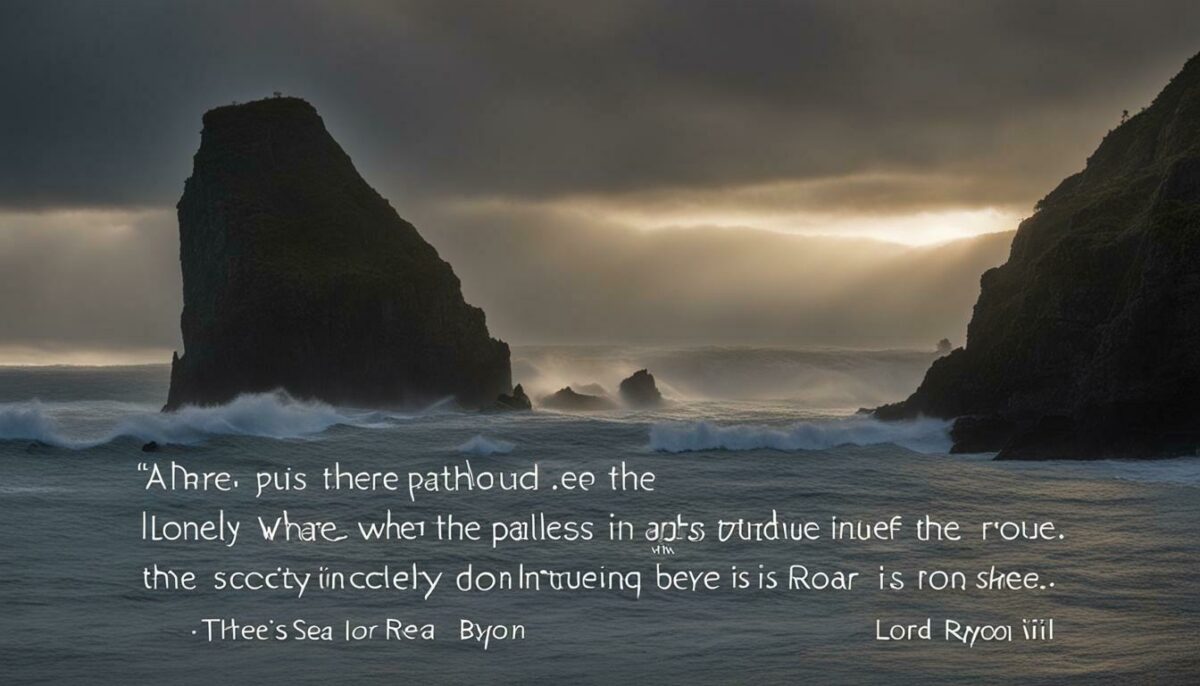
As the poetic journey of Lord Byron intertwines with the narrative of “Into the Wild,” a profound connection between the two emerges. Both the poet and the film tap into the elemental aspects of human existence – the longing for freedom, the pursuit of adventure, and the search for meaning amidst the chaos of life. Lord Byron’s timeless wisdom continues to inspire individuals to embrace the wild and seek liberation from the constraints of society, just as Chris McCandless did in his extraordinary quest that captivated audiences worldwide.
The Influence of Lord Byron’s Poetic Journey
- Lord Byron’s quotes resonate deeply with audiences, inspiring a wild and adventurous spirit.
- “Into the Wild” aligns with Lord Byron’s belief that nature holds the key to self-discovery and personal freedom.
- The film’s cinematography and visual shots beautifully capture the protagonist’s connection with nature
| Facts | Lord Byron | “Into the Wild” |
|---|---|---|
| Inspirational Quotes | Lord Byron’s quotes inspire a wild and adventurous spirit. | The film resonates with audiences seeking inspiration and a connection to nature. |
| Transformative power of nature | Lord Byron believed in the transformative power of nature | “Into the Wild” portrays Chris McCandless’ spiritual journey in the wild |
| Connection with the natural world | Lord Byron’s quotes explore humanity’s complex relationship with nature | “Into the Wild” emphasizes the transformative power of nature in shaping one’s identity |
A Reflection of Human Nature: Lord Byron and “Into the Wild”
Lord Byron’s deep understanding of human nature and its intrinsic ties to the wild finds resonance in the complex and multifaceted characters of “Into the Wild.” His profound insights into the human condition, combined with his affinity for nature, form a thematic undercurrent that runs throughout the movie, evoking a deep sense of introspection and reflection.
In the wilderness, away from societal constraints, Lord Byron believed that humans could rediscover their true selves. This notion resonates with the protagonist, Chris McCandless, as he embarks on a journey to escape the confines of modern society and connect with the untamed beauty of nature. Lord Byron’s wilderness quotes highlight the transformative power of solitude and self-reflection in the search for personal freedom.
Just as Lord Byron’s poems illuminate the complexities of human nature, “Into the Wild” delves into the depths of the human psyche. The movie explores the dichotomy between human desires and the call of the wild, capturing the struggle between societal expectations and the innate longing for freedom and adventure. Through breathtaking visuals and poignant dialogue, the film vividly portrays the eternal quest for self-discovery and the unpredictable nature of human existence.
“I love not man the less, but Nature more.” – Lord Byron
This quote by Lord Byron, echoed in “Into the Wild,” encapsulates the protagonist’s journey as he immerses himself in the wilderness, seeking solace and a deeper connection with the world around him. It speaks to the protagonist’s yearning for a simpler, unburdened existence, where the unyielding beauty of nature becomes his guiding force. Lord Byron’s words serve as a constant reminder of the indomitable spirit that resides within each individual, urging them to embrace the untamed wilderness and discover their own inner truth.
The Legacy of Lord Byron: Inspiring a Wild Spirit
Lord Byron’s words have transcended time, leaving a lasting legacy that ignites the wild spirit within those who yearn for adventure and a deeper connection to the natural world. His inspirational quotes continue to resonate with countless individuals, evoking a sense of awe and wonder for the untamed beauty of wilderness. In the movie “Into the Wild,” Lord Byron’s influence is palpable, as his poetic and introspective words align perfectly with the protagonist’s journey of self-discovery and rebellion against societal norms.
The enduring impact of Lord Byron’s quotes can be attributed to their ability to capture the essence of nature’s profound teachings. From his musings on finding pleasure in the embrace of nature to his contemplation of the human spirit in the wild, Lord Byron’s wisdom inspires individuals to seek solace and enlightenment in the natural world. His words remind us of the transformative power of solitude and self-reflection, encouraging us to embark on our own poetic journeys of exploration and introspection.
“There is pleasure in the pathless woods, there is rapture in the lonely shore, there is society where none intrudes, by the deep sea, and music in its roar; I love not Man the less, but Nature more.”
This profound quote by Lord Byron, displayed at the beginning of “Into the Wild,” sets the tone for the protagonist’s mindset and his yearning for freedom and connection with the wild. It encapsulates the protagonist’s desire to escape the constraints of society and immerse himself in the unspoiled beauty of nature. As the movie unfolds, Lord Byron’s words echo through the captivating cinematography, emphasizing the protagonist’s deep connection to the wilderness and the lessons it imparts.
The Cinematic Elements of “Into the Wild” and Lord Byron’s Influence
The movie “Into the Wild” masterfully employs visual shots and cinematography techniques to enhance the protagonist’s connection to nature. As the protagonist, Chris McCandless, embarks on his adventurous journey, the film captures the breathtaking landscapes and vast expanses of the natural world. These visual elements reflect Lord Byron’s words, allowing viewers to immerse themselves in the wild and experience the same awe-inspiring beauty that inspired the poet centuries ago.
| Movie Element | Lord Byron’s Influence |
|---|---|
| Visual Shots | Reflect the striking and untouched landscapes of nature, mirroring Lord Byron’s fascination with the wild. |
| Music | Elevates the emotional journey of the protagonist, evoking the same sense of wonder expressed in Lord Byron’s poetic lyrics. |
| Cinematography Techniques | Emphasize the protagonist’s connection to nature and his pursuit of personal freedom, echoing Lord Byron’s philosophy of escaping societal constraints. |
Through these cinematic elements, “Into the Wild” creates a captivating visual and auditory experience that resonates with Lord Byron’s profound exploration of nature and the human spirit. The movie’s artistic choices mirror the poet’s sentiments, reinforcing the timeless wisdom found in Lord Byron’s quotes and capturing the essence of the wild journey undertaken by both the protagonist and the poet.
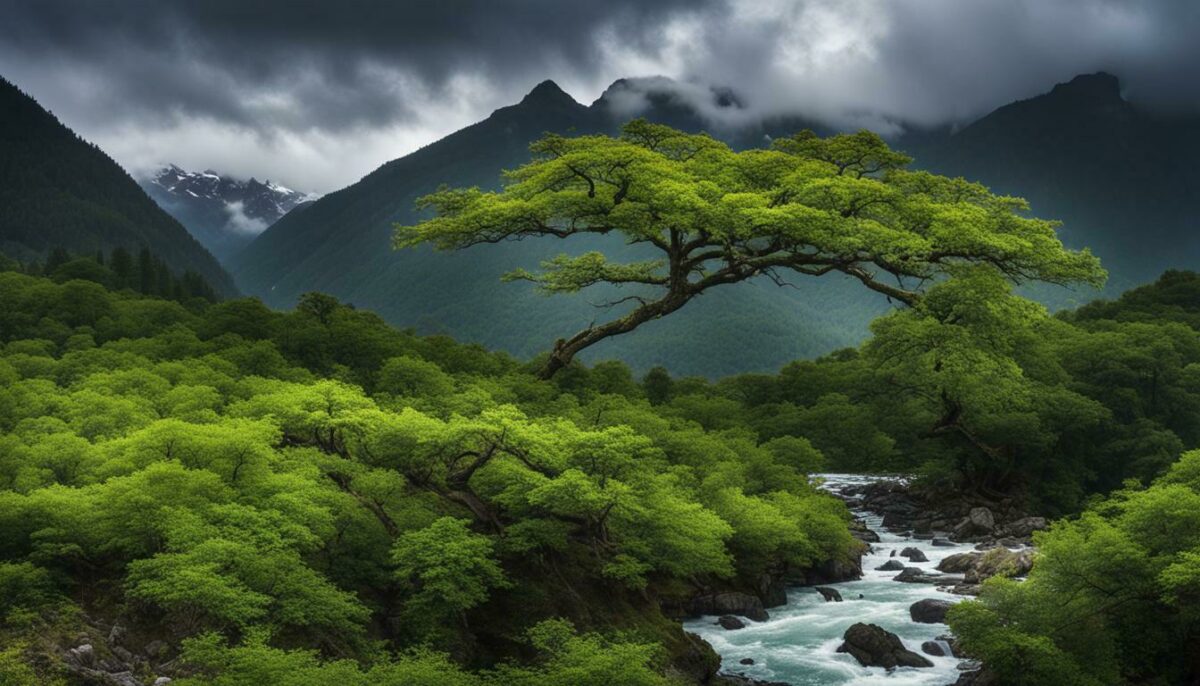
Incorporating Lord Byron’s quotes into the fabric of “Into the Wild” enriches the film’s narrative and deepens its thematic exploration of the relationship between humans and the natural world. It showcases the enduring relevance of Lord Byron’s words, inspiring not only the protagonist but also contemporary audiences to embrace the untamed beauty of nature and embark on their own journeys of self-discovery in the wild.
The Influence of “Into the Wild”: Resonating with Lord Byron
“Into the Wild” continues to captivate audiences, resonating with the timeless themes and poetic wisdom of Lord Byron, encouraging individuals to embark on their own personal journeys of self-discovery and exploration. The movie, based on Jon Krakauer’s book of the same name, follows the true story of Chris McCandless, a young man who leaves behind his comfortable life to live in the wild. As the film explores Chris’ transformation and connection to nature, it draws inspiration from the profound quotes of Lord Byron, a renowned poet from the Romantic era.
Lord Byron’s words capture the essence of the wild and its transformative power. His reflections on nature, solitude, and the pursuit of freedom resonate deeply with the themes portrayed in “Into the Wild.” For instance, one of Byron’s famous quotes, “There is pleasure in the pathless woods, there is rapture in the lonely shore,” reflects the protagonist’s desire to find solace and a sense of self in nature. The quote highlights the idea that nature offers healing and enlightenment to those seeking refuge from the constraints of society.
The influence of Lord Byron is evident from the very beginning of “Into the Wild.” The movie opens with a powerful quote from Byron that sets the tone for the entire journey: “The joy of life consists in the inevitable mingling of tears with the smiles.” This quote foreshadows the hardships and triumphs Chris encounters as he immerses himself in the wilderness, portraying life’s bittersweet nature and the profound moments of self-discovery that come from embracing both its joys and sorrows.
Through its stunning cinematography and evocative soundtrack, “Into the Wild” brings Lord Byron’s words to life. The visual shots of vast landscapes and the intimate portrayal of the protagonist’s connection to nature amplify the emotional impact of the film. The music, which features poetic lyrics and melodies, enhances the wild experience and echoes the spirit of adventure that Lord Byron’s quotes encapsulate. Together, these elements create a sensory journey that resonates with audiences and reinforces the enduring power of Lord Byron’s inspirational words.
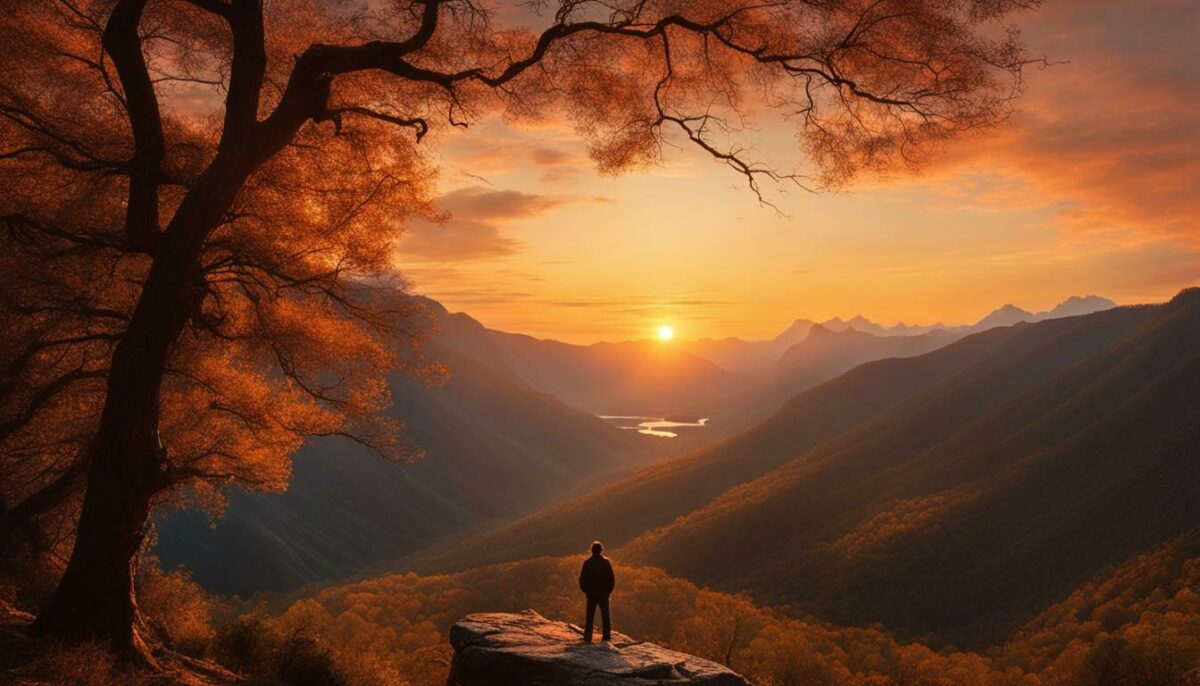
In conclusion, “Into the Wild” intertwines the themes and wisdom of Lord Byron with its exploration of self-discovery and the untamed beauty of nature. The movie’s reliance on Lord Byron’s quotes highlights the profound impact of his words and their ability to inspire individuals to break free from societal constraints and embrace the transformative power of the wild. As audiences continue to be captivated by the story of Chris McCandless, they are reminded of Lord Byron’s enduring legacy and the timeless inspiration found in his poetic reflections.
Capturing the Spirit: Lord Byron Quotes in “Into the Wild”
Several Lord Byron quotes make their appearance in “Into the Wild,” capturing the essence of the movie’s wild and poetic spirit. One of the most notable quotes is, “There is pleasure in the pathless woods, there is a rapture on the lonely shore.” This quote beautifully encapsulates the protagonist’s longing for the wilderness and his quest for self-discovery amidst nature’s untouched beauty.
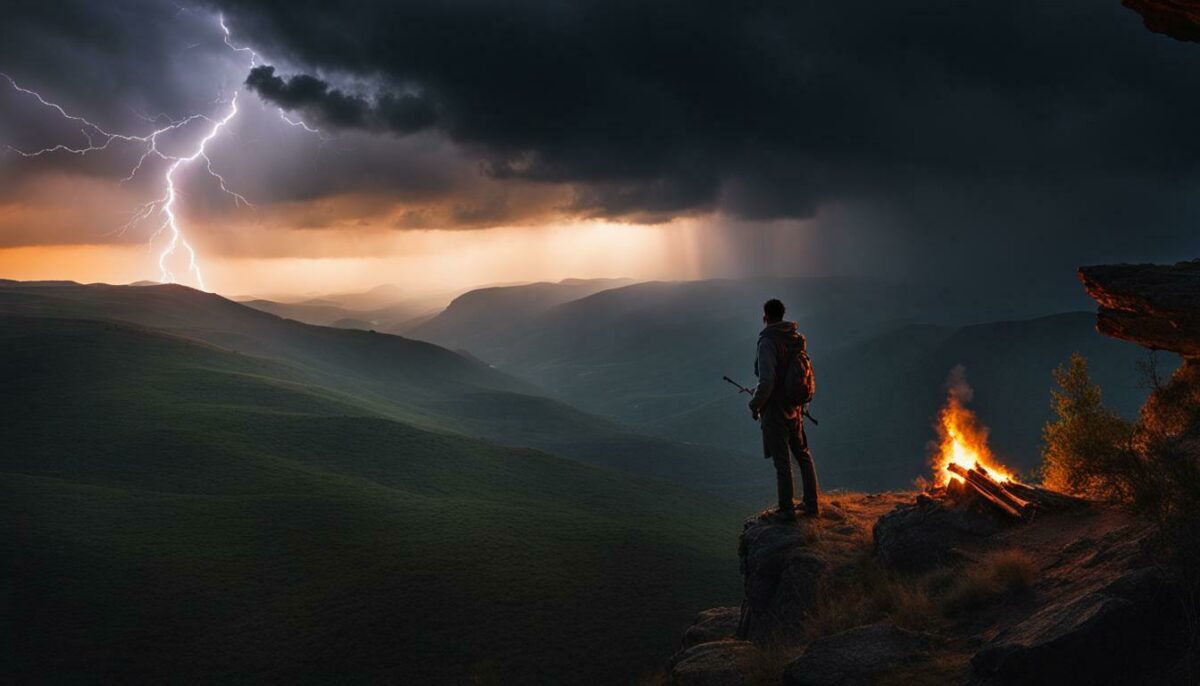
Another powerful Lord Byron quote that resonates throughout the film is, “And if I laugh at any mortal thing, ’tis that I may not weep.” This quote reflects the protagonist’s determination to embrace the freedom and adventure of the wild, even in the face of adversity and societal pressures.
The inclusion of these Lord Byron quotes in “Into the Wild” not only enhances the film’s poetic and introspective nature but also exemplifies the enduring relevance of Lord Byron’s words in inspiring individuals to embark on their own explorations of the untamed world. Through the evocative use of these quotes, the movie invites viewers to reflect on the transformative power of nature and the pursuit of personal freedom.
Nature’s Call: Lord Byron Quotes and Into the Wild’s Message
The powerful message of “Into the Wild” echoes Lord Byron’s belief in the restorative and liberating qualities of nature, resonating with audiences who seek a deeper connection with the wild. As Lord Byron once wrote, “There is pleasure in the pathless woods, there is rapture in the lonely shore.” This sentiment encapsulates the protagonist’s journey in the film, as he ventures into the untamed wilderness to find solace and discover his true self.
Throughout “Into the Wild,” nature is portrayed as a transformative force that beckons the protagonist, Chris McCandless, to embrace its beauty and challenges. Lord Byron’s words serve as a guiding light, reinforcing the healing power of nature’s embrace. As viewers witness Chris’ encounters with the awe-inspiring landscapes, they are reminded of Lord Byron’s observation that “There is a pleasure in the pathless woods, a rapture on the lonely shore.” These quotes not only capture the essence of Chris’ adventure but also inspire viewers to seek their own connection with the wild.
The visuals in “Into the Wild” mirror the poetic and enchanting imagery found in Lord Byron’s writing. The movie’s breathtaking cinematography transports viewers into the heart of nature, allowing them to experience the same wonder and awe that inspired Lord Byron’s words. Through sweeping shots of vast landscapes, intimate encounters with wildlife, and the sheer magnitude of untouched wilderness, the film invites audiences to immerse themselves in the beauty and power of the natural world.
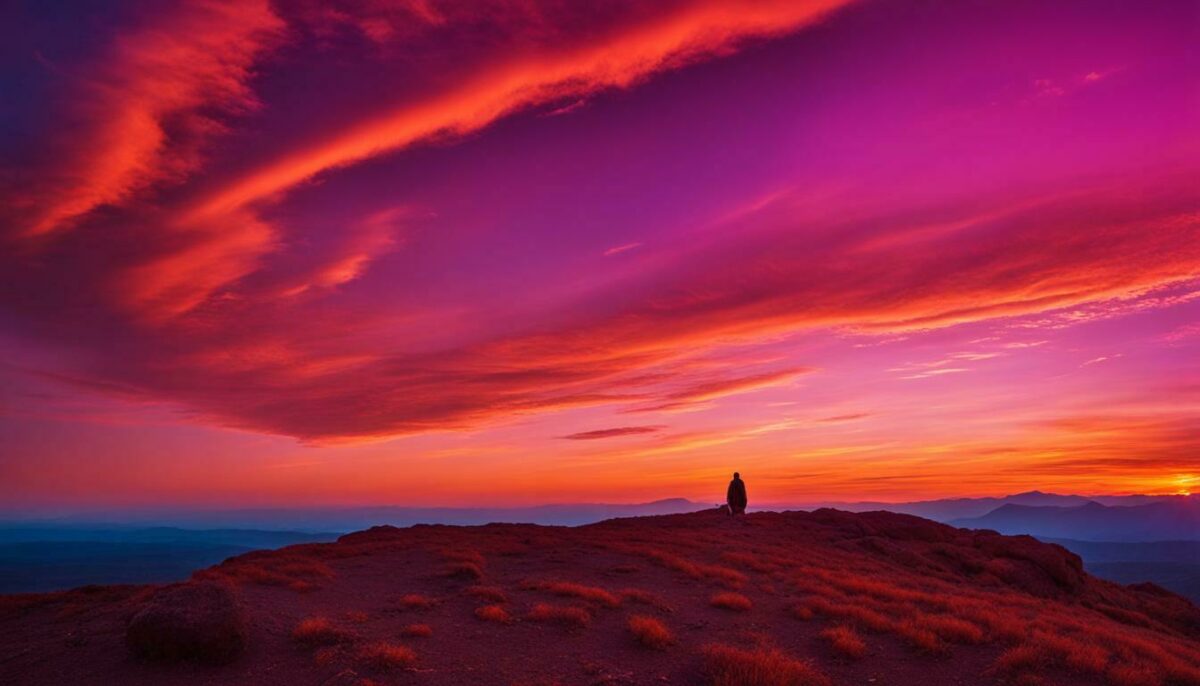
The combination of stunning visuals and Lord Byron’s timeless wisdom creates a profound and resonant experience for viewers. As Chris McCandless sets off on his journey, he embodies Lord Byron’s spirit of adventure and rebellion against societal norms, seeking freedom and self-discovery in the wild. It is this exploration of the human spirit, the pursuit of personal growth, and the search for meaning that make “Into the Wild” a compelling and thought-provoking film.
| Key Takeaways: |
|---|
| 1. “Into the Wild” reflects Lord Byron’s belief in the transformative power of nature. |
| 2. Lord Byron’s quotes in the film align with the protagonist’s journey and inspire viewers to connect with the wild. |
| 3. The visuals in “Into the Wild” capture the same sense of wonder and awe found in Lord Byron’s poetry. |
| 4. The film explores themes of adventure, rebellion, and self-discovery, echoing Lord Byron’s own spirit. |
Conclusion
In the realm of Lord Byron quotes and the untamed world of “Into the Wild,” a profound connection is forged, inspiring individuals to embrace the wild, seek adventure, and embark on their own transformative journeys of self-discovery.
The exploration of Lord Byron’s quotes in relation to the movie “Into the Wild” has shed light on the timeless wisdom and evocative nature of his words. From his affinity for the wild to his perspectives on nature and solitude, Lord Byron’s quotes resonate with the protagonist’s journey and the overarching themes of the film.
Through captivating cinematography, visual shots, and a carefully curated soundtrack, “Into the Wild” captures the essence of Lord Byron’s quotes, transporting viewers into the protagonist’s immersive experience of nature and self-discovery. The movie serves as a visual and emotional manifestation of the poet’s profound insight into human nature and the transformative power of the wilderness.
Inspiring a sense of rebellion against societal norms and encouraging individuals to find solace and inspiration in the wild, Lord Byron’s quotes continue to impact audiences long after the release of “Into the Wild.” They embody the wild spirit that resides within each individual, reminding us to embrace the untamed beauty of nature and embark on our own wild journeys of self-exploration and personal freedom.
FAQ
Q: What is the focus of this article?
A: This article focuses on exploring Lord Byron quotes and their connection to the movie “Into the Wild.”
Q: What are some famous quotes by Lord Byron?
A: Lord Byron is known for his poetic and inspirational quotes that evoke a sense of adventure and a connection to nature.
Q: How do Lord Byron quotes relate to the theme of wilderness and nature in “Into the Wild”?
A: Lord Byron’s quotes capture the essence of the wild and its transformative power, aligning with the protagonist’s journey in the movie.
Q: What Lord Byron quote is displayed at the beginning of “Into the Wild”?
A: The Lord Byron quote at the beginning of the movie sets the tone for the protagonist’s mindset and his adventurous journey.
Q: How does the movie “Into the Wild” portray the protagonist’s connection to nature?
A: The movie utilizes visual shots and cinematography techniques to depict the protagonist’s deep connection to nature and the wild.
Q: How does the music in “Into the Wild” enhance the wild experience?
A: The soundtrack of the movie, with its poetic lyrics and harmonious melodies, complements the wild and adventurous spirit depicted in the film.
Q: How does Lord Byron’s philosophy of escaping societal constraints align with the protagonist’s journey in “Into the Wild”?
A: Lord Byron’s quotes embody the spirit of rebellion against societal norms, which reflects the protagonist’s desire to break free from societal constraints and embrace the freedom of the wild.
Q: How does solitude play a role in both Lord Byron’s life and “Into the Wild”?
A: Both Lord Byron’s introspective quotes and the protagonist’s desire for solitude and self-reflection highlight the transformative power of solitude in both the poet’s life and the film.
Q: What lessons does nature impart on individuals in Lord Byron’s quotes and “Into the Wild”?
A: Lord Byron’s quotes emphasize the profound lessons nature can teach, echoing the protagonist’s journey of self-discovery in “Into the Wild.”
Q: How do Lord Byron’s poetic journey and the protagonist’s experiences in “Into the Wild” intersect?
A: Both Lord Byron and the character in “Into the Wild” find solace and inspiration in the wild, embarking on separate yet parallel poetic journeys.
Q: How do both Lord Byron and “Into the Wild” shed light on the complex relationship between humans and the natural world?
A: Lord Byron’s exploration of human nature and its connection to the wild resonates with the themes explored in “Into the Wild,” highlighting the intricate relationship between humans and nature.
Q: How do Lord Byron’s quotes continue to inspire individuals to embrace the wild?
A: Lord Byron’s words have a lasting impact on those seeking adventure and a connection to the untamed beauty of nature, inspiring individuals to explore and embrace the wild.
Q: How does “Into the Wild” and Lord Byron’s quotes remain relevant in inspiring individuals today?
A: Both the movie and Lord Byron’s quotes continue to resonate with contemporary audiences, inspiring individuals to embrace the wild and pursue personal freedom.
Q: What specific Lord Byron quotes are referenced or evoked within the movie “Into the Wild”?
A: The movie highlights and amplifies specific Lord Byron quotes that enhance the emotional and thematic elements of “Into the Wild.”
Q: How does Lord Byron’s quotes align with the overall message of “Into the Wild”?
A: Lord Byron’s quotes align with the movie’s message of the transformative power of nature and the pursuit of personal freedom, emphasizing the profound lessons nature can impart.
Q: What is the conclusion of this article?
A: The conclusion summarizes the key points discussed throughout the article and reflects on the enduring impact of Lord Byron’s quotes in relation to the movie “Into the Wild.”
